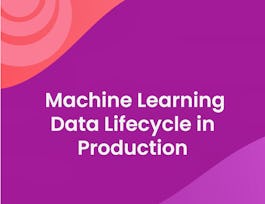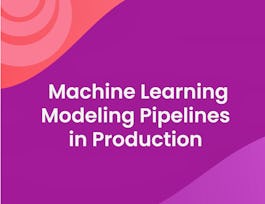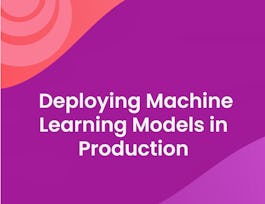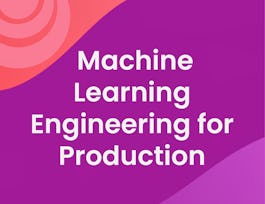**Starting May 8, enrollment for the Machine Learning Engineering for Production Specialization will be closed. Please enroll in this specialization or to individual courses by then to gain access to this course material.**

Introduction to Machine Learning in Production
This course is part of Machine Learning Engineering for Production (MLOps) Specialization
Taught in English
Some content may not be translated


Instructors: Andrew Ng
Top Instructor
108,324 already enrolled
Course
(2,835 reviews)
98%
Recommended experience
What you'll learn
Identify the key components of the ML lifecycle and pipeline and compare the ML modeling iterative cycle with the ML product deployment cycle.
Understand how performance on a small set of disproportionately important examples may be more crucial than performance on the majority of examples.
Solve problems for structured, unstructured, small, and big data. Understand why label consistency is essential and how you can improve it.
Skills you'll gain
Details to know

Add to your LinkedIn profile
6 quizzes
Course
(2,835 reviews)
98%
Recommended experience
See how employees at top companies are mastering in-demand skills

Build your subject-matter expertise
- Learn new concepts from industry experts
- Gain a foundational understanding of a subject or tool
- Develop job-relevant skills with hands-on projects
- Earn a shareable career certificate


Earn a career certificate
Add this credential to your LinkedIn profile, resume, or CV
Share it on social media and in your performance review

There are 3 modules in this course
This week covers a quick introduction to machine learning production systems focusing on their requirements and challenges. Next, the week focuses on deploying production systems and what is needed to do so robustly while facing constantly changing data.
What's included
9 videos4 readings2 quizzes1 app item1 ungraded lab
This week is about model strategies and key challenges in model development. It covers error analysis and strategies to work with different data types. It also addresses how to cope with class imbalance and highly skewed data sets.
What's included
16 videos2 readings2 quizzes1 ungraded lab
This week is all about working with different data types and ensuring label consistency for classification problems. This leads to establishing a performance baseline for your model and discussing strategies to improve it given your time and resources constraints.
What's included
16 videos5 readings2 quizzes1 ungraded lab
Instructors

Offered by
Recommended if you're interested in Machine Learning

DeepLearning.AI

DeepLearning.AI

DeepLearning.AI

DeepLearning.AI
Why people choose Coursera for their career




Learner reviews
Showing 3 of 2835
2,835 reviews
- 5 stars
84.79%
- 4 stars
12.57%
- 3 stars
1.82%
- 2 stars
0.52%
- 1 star
0.28%
New to Machine Learning? Start here.

Open new doors with Coursera Plus
Unlimited access to 7,000+ world-class courses, hands-on projects, and job-ready certificate programs - all included in your subscription
Advance your career with an online degree
Earn a degree from world-class universities - 100% online
Join over 3,400 global companies that choose Coursera for Business
Upskill your employees to excel in the digital economy
Frequently asked questions
Access to lectures and assignments depends on your type of enrollment. If you take a course in audit mode, you will be able to see most course materials for free. To access graded assignments and to earn a Certificate, you will need to purchase the Certificate experience, during or after your audit. If you don't see the audit option:
The course may not offer an audit option. You can try a Free Trial instead, or apply for Financial Aid.
The course may offer 'Full Course, No Certificate' instead. This option lets you see all course materials, submit required assessments, and get a final grade. This also means that you will not be able to purchase a Certificate experience.
When you enroll in the course, you get access to all of the courses in the Specialization, and you earn a certificate when you complete the work. Your electronic Certificate will be added to your Accomplishments page - from there, you can print your Certificate or add it to your LinkedIn profile. If you only want to read and view the course content, you can audit the course for free.
If you subscribed, you get a 7-day free trial during which you can cancel at no penalty. After that, we don’t give refunds, but you can cancel your subscription at any time. See our full refund policy.